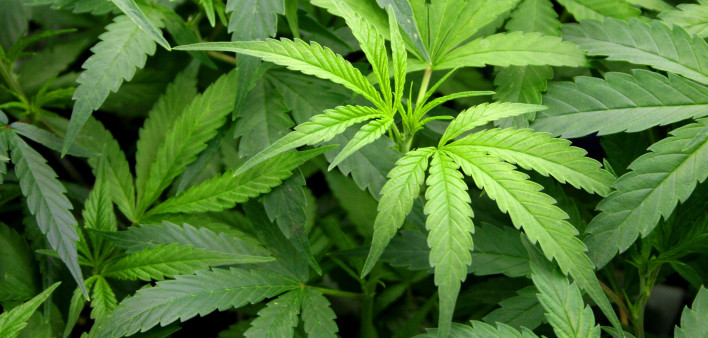Studies have found that around a third of people living with HIV have recently used marijuana, and up to 75% have ever done so. Cannabis is more easily available than ever now that recreational use is legal in nearly half of U.S. states, and most of the rest allow medical use. Cannabis and its components have been shown to improve appetite and relieve pain, nausea and insomnia. What’s more, it appears to have anti-inflammatory properties.
People with HIV—even those on effective antiretroviral treatment—may have a damaged gut lining (“leaky gut”) and chronic inflammation that can lead to a wide range of comorbidities. The effects of cannabis on immune function in HIV-positive people are not fully understood, but several recent studies shed light on this question.
A small study by researchers at the University of North Carolina Chapel Hill and Duke University found that among people with HIV on antiretroviral therapy with viral suppression, cannabis use was associated with an increase in naive T cells, a decrease in effector T cells and reduced expression of various biomarkers of immune activation. Further, cannabis users had fewer exhausted or senescent T cells compared with nonusers. Cannabis use was not linked to HIV-specific CD8 T-cell responses or changes in the size of the viral reservoir in CD4 T cells.
In another study by researchers in Canada, 10 HIV-positive people on antiretroviral therapy were randomized to receive capsules containing increasing doses of cannabidiol (CBD) with or without delta9-tetrahydrocannabinol (THC), two of the active components in marijuana. The researchers observed reduced impairment of the gut lining, less T-cell exhaustion (as indicated by PD-1 expression), fewer activated monocytes and senescent CD4 and CD8 cells and a reduction in inflammatory biomarkers. Here, too, there was no change in the HIV DNA reservoir in peripheral CD4 cells.
“These preliminary findings support the use of further evaluation of orally administrated cannabinoid capsules in larger clinical trials as a potential strategy to help alleviate chronic inflammation experienced by people with HIV despite antiretroviral therapy,” the study authors concluded.
On the other hand, a study conducted in Zambia suggests cannabis use may alter HIV tissue reservoirs. The researchers analyzed brain and other tissue samples from autopsies of 20 men with HIV who had viral suppression at the time of death, half of whom tested positive for cannabis. Men who used cannabis were less likely to have detectable HIV DNA in their tissues, and those who did had lower levels. Inflammatory cytokine levels in lymphoid tissue were also lower.
Three studies presented at this year’s Conference on Retroviruses and Opportunistic Infections (CROI) further elucidated the immunological effects of cannabis in people with HIV.
Robert Langat, PhD, of the University of Minnesota, and colleagues compared immune function and intestinal health among people on antiretroviral therapy who did and did not use cannabis. While overall T-cell numbers did not differ, cannabis users had fewer activated CD4 and CD8 T-cells, suggesting lower immune activation and less inflammation. Cannabis users also showed evidence of enhanced mucosal immunity in the gut and differences in their bacterial microbiome. “Cannabis use has the potential to alleviate HIV-associated inflammation through alterations in microbial community structure and function,” the study authors wrote.
Researchers from Germany and the Netherlands analyzed the effect of cannabis on DNA methylation and immune function in more than 1,800 HIV-positive people with viral suppression, about 20% of whom reported cannabis use. People who smoked cannabis showed changes in DNA methylation, a process that turns genes on or off. Some of these changes were previously seen in tobacco smokers in other studies. These modifications were associated with both pro-inflammatory and anti-inflammatory effects on immune cells and cytokine production. DNA changes associated with cannabis inhalation may influence immune response in people with HIV, so studies looking at inflammation should record and control for marijuana use, the researchers suggested.
Another Dutch study aimed to tease out the anti-inflammatory effects of cannabis from the pro-inflammatory effects of smoking in nearly 1,900 people on antiretroviral therapy. Cannabis use was associated with upregulation of 15 proteins and downregulation of 50 proteins. Immune function generally did not differ between cannabis users and nonusers, but tobacco use was associated with extensive expression of immune-related proteins, increased inflammatory cytokine production and changes in immune cells. “Our results suggest that cannabis has systemic anti-inflammatory effects, and little effect on immune function, even when used by inhalation,” the researchers concluded.
Taken together, these study results suggest that cannabis use—especially by methods other than smoking—might have beneficial effects on immune function and inflammation in people living with HIV. However, randomized controlled clinical trials of cannabis or cannabinoid administration are still lacking. This new research is consistent with the findings of a 2021 review of human and animal studies, which found that cannabinoids, especially CBD, are anti-inflammatory in the setting of HIV, in part due to stabilization of the gut lining. “Cannabis may provide a beneficial intervention to reduce morbidity related to inflammation in people with HIV,” the review authors concluded.
But cannabis is not a panacea. A large study recently published in the Journal of the American Heart Association, which surveyed more than 430,000 mostly HIV-negative people, found that cannabis use was associated with increased risk of coronary heart disease, heart attack and stroke. Long-term heavy marijuana use can have negative effects on mood, cognition and memory. Some studies have found that cannabis use can interfere with adherence to antiretroviral treatment. What’s more, smoking marijuana, like tobacco cigarettes, can damage the lungs and may increase the risk of cancer, so using edible forms of cannabis or CBD could be a healthier choice.
Click here for more news about cannabis and health.







Comments
Comments